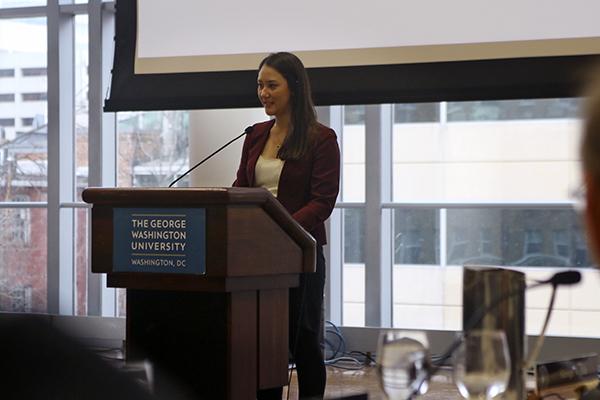Updated: Feb. 22, 2016 at 12:15 p.m.
Twenty student volunteers will run GW’s first peer support program when it opens this fall.
The students selected to operate the hotline are taking a training course once a week this semester, Chris Evans, the director of health and wellness on the Student Association, said. He said the SA executive cabinet reviewed about 100 applications for the positions, which opened in October.
“We were excited to see such overwhelming interest in the program, and are thankful that our student community is so passionately interested in stepping up to serve their peers in a time of need and help fight the stigma surrounding mental health,” Evans said in an email this week.
Evans said Mental Health Services, the Colonial Health Center and “relevant” academic departments helped to create the training course for this semester, but he did not give specifics on the course.
Evans added that the program has attracted students from a “wide range of backgrounds” and different academic fields, student organizations and experiences, as well as students who have lived on both the Foggy Bottom and Mount Vernon campuses.
“We believe that this diversity in experiences and interests will allow the first GW Listens cohort to uniquely connect with their peers during a time of need,” Evans said.
Those trainings total two and a half hours per week and give volunteers a range of scenarios they could encounter, from students who feel academically overwhelmed to those facing depression. The sessions also focus on teaching problem-solving strategies and tactics to encourage active listening, Evans said.
Students remain anonymous whether they are calling the hotline or answering the phones. One student who has been picked to staff the hotline and spoke on the condition of anonymity, said he is “excited for GW Listens to bring back a level of understanding, empathy and humanity to campus.”
“On our campus, people like to show that they’ve got it together, but I want everyone to know that it’s OK if you don’t have it together, and there’s somewhere to turn if you feel like you don’t,” the student said.
Officials have repeatedly declined to provide details about the hotline, saying the program was not ready for them to discuss. Mark Levine, the senior associate dean of students, declined to comment for this story.

SA President Andie Dowd gave an update on the program to the Board of Trustees this month, publicly announcing for the first time that students had finished reviewing applications for the volunteer positions.
“GW Listens will be very beneficial for students, their mental health and to help guide them through their time at GW and peers looking out for them at all times,” Dowd said.
Student health and wellness were at the top of Dowd’s platform when she ran for SA President last year, and she said she would work to make sure the program, which was proposed by former SA President Nick Gumas, would be fully developed. During the Board of Trustees meeting, she said costs for Mental Health Services are still a concern for students.
“An increased need to lower the cost of Mental Health Services is necessary,” Dowd said.
Students can attend six free counseling sessions every year. The peer counseling program would be open three to four nights a week, and leaders hope to have it open on Sundays when students are stressed about the upcoming week.
Evans said GW’s program would mirror Columbia University’s hotline when the SA was planning the hotline. Jenny Payne, one of the student directors for Columbia University’s peer support hotline, said having a diverse group of students is essential to making sure they’re able to effectively respond to peers’ concerns when they call in.
“It isn’t about people coming in with background or skill but it’s about integrating it in a way that they might talk to someone who called in,” Payne said.
She said mental health has become a more prominent topic on their campus since the hotline launched.
“There might be one week where students are experiencing something difficult,” Payne said. “I think that Nightline serves as a good space for those times of the night when something is on your mind and it really sucks, but you don’t necessarily need to go to counseling services about it.”
SA leaders have made mental health one of their main priorities over the past three years and the health center moved from off campus to the Marvin Center in 2015. Senators advocated for the addition of a two-day fall break, which officials will run on a trial basis in October, to help reduce stress about midterms.
This post was updated to reflect the following correction:
The Hatchet incorrectly reported the health center moved from K street to campus in 2013. The move was complete in 2015. We regret this error.







